Oct. 24, 2023 – Attorneys from across Wisconsin gathered at the Kalahari Resort in Wisconsin Dells on Oct. 19-20 for the State Bar of Wisconsin’s annual Solo and Small Firm Conference (WSSFC).
Presenters discussed the effect artificial intelligence (AI) tools and other technological advances are likely to have on solo and small-firm attorneys. Attendees attended several networking receptions and sampled goods and services from dozens of vendors.
Treat AI ‘Like an Intern’
Ben Schorr, a senior content program manager at Microsoft, gave attendees an overview of generative AI during a Thursday morning plenary presentation titled “ChatGPT: The Future is Here.”
Schorr likened ChatGPT to an advanced version of the auto-correct feature in word processing programs. ChatGPT can create text based on prompts, or inputs, from users.
“Where AI really shows up today is not flying cars,” Schorr said. “Where AI shows up today is saving you ten seconds here, five minutes there, ten minutes here. It’s saving you these little chunks of time and increasing your productivity.”
Schorr cited using AI to write an email to a client as one example.
AI is unlikely to replace lawyers anytime soon, Schorr said.
“It doesn’t bring your judgment, your experience or your capacity for empathy,” Schorr said. “It can do some very straightforward tasks, based on your specific instructions.”
Rather, attorneys will learn to work alongside AI.
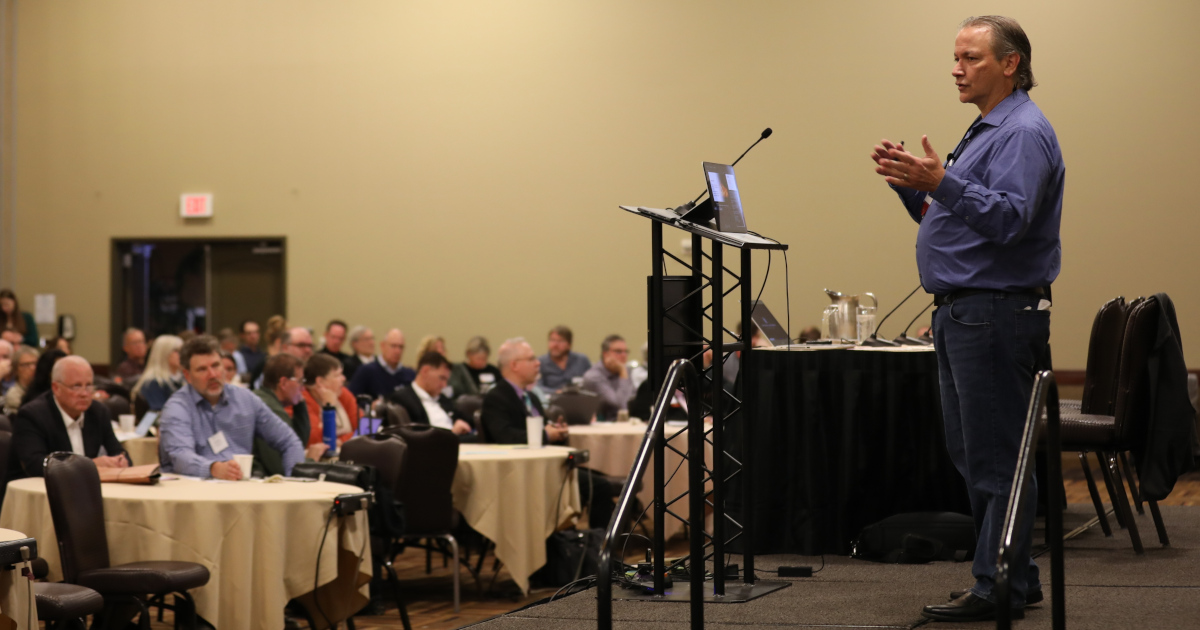
Ben Schorr, a senior content program manager at Microsoft, gave a presentation on generative AI during a plenary presentation on Thursday, Oct. 19.
AI is not perfect, Schorr said. It uses large language learning to predict the appropriate response to user prompts.
“It’s not magic,” Schoor said. “It’s just math.”
Attorneys should check work generated by AI for errors.
“When it’s done, you need to review its work,” Schorr said of AI. “Treat it like an intern.”
Schorr also emphasized the wide-ranging effect that the rise of AI will have on the legal profession.
“AI isn’t going to take your job,” Schorr said. “A lawyer who uses AI is going to take your job. That’s probably true in just about every industry.”
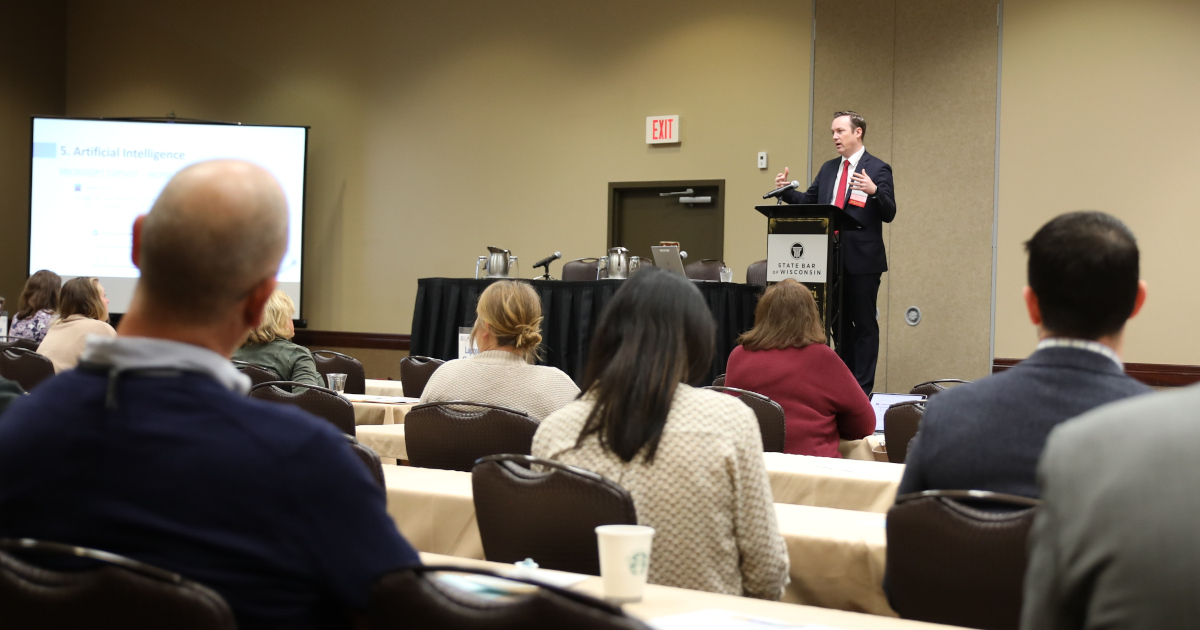
Chris Shattuck discussed the role AI plays in allowing lawyers to be more productive on Thursday, Oct. 19.
More Time for Billable Work
Attorneys looking to shed administrative tasks so they can spend more time on billable work will need to rely on AI.
That was the message imparted by Chris Shattuck, the legal studies/paralegal program director at Madison College, and Jeffrey Krause, a consultant, during a Thursday morning session titled “Technology Considerations When Setting Up a Law Practice.”
“Very soon, AI is going to be embedded in everything that you’re doing,” Shattuck said, referring to the fact that upcoming versions of Microsoft programs like Word and Excel will include AI.
The rise of AI will allow an attorney to hand off administrative busywork that can’t be billed to clients, so he or she can spend more time on billable matters, Shattuck said.
AI will also reduce the time that attorneys spend on research. That, Shattuck said, makes it imperative for attorneys to be among the early adopters of AI.
“If you’re in a town where someone else is using AI and they’re able to provide more services to their clients at a reduced cost, what is that going to do for your law firm?” Shattuck said.
“If it’s going to take you four hours to research something and it only takes your competitor a quarter of that time, and they’re being more cost-effective in providing services and the clients find out about that, what’s going to happen?” Shattuck said.
Jumping the Generation Gap
Three panelists from different generations discussed the challenges posed by a workforce made up of members of five generations during “Jumping the Generation Gap,” a plenary session held on Thursday afternoon.
Sarah Muender, a lab coach with Lawyerist, led the panel. She pointed out that the workforce is made up of members of five generations – members of the Silent Generation (born 1925-1945) all the way to members of Generation Z (2001-2020).
Alexis Garuz, a Millennial who’s an attorney at Garuz Crawford LLC in Waukesha, said that in her practice, the generation gap shows up in the way she both communicates with and prospects for clients.
Garuz, a criminal defense attorney, said that many of her clients are younger and prefer to communicate by text message. She also said that she’s found clients through videos she posted on Tik Tok.
Randy Nash, a Baby Boomer and owner of Nash Law LLC in Milwaukee, said that when he was a young lawyer, mentoring in law firms was catch as catch can.
“At one firm, I think they actually penalized you if you mentored anyone,” Nash said.
Nash said he hopes that lawyers from his generation have learned from that experience and are more willing to mentor young lawyers today.
“I do think that this idea that those of us who’ve reached the older stage can help the younger ones makes a lot of sense,” Nash said.
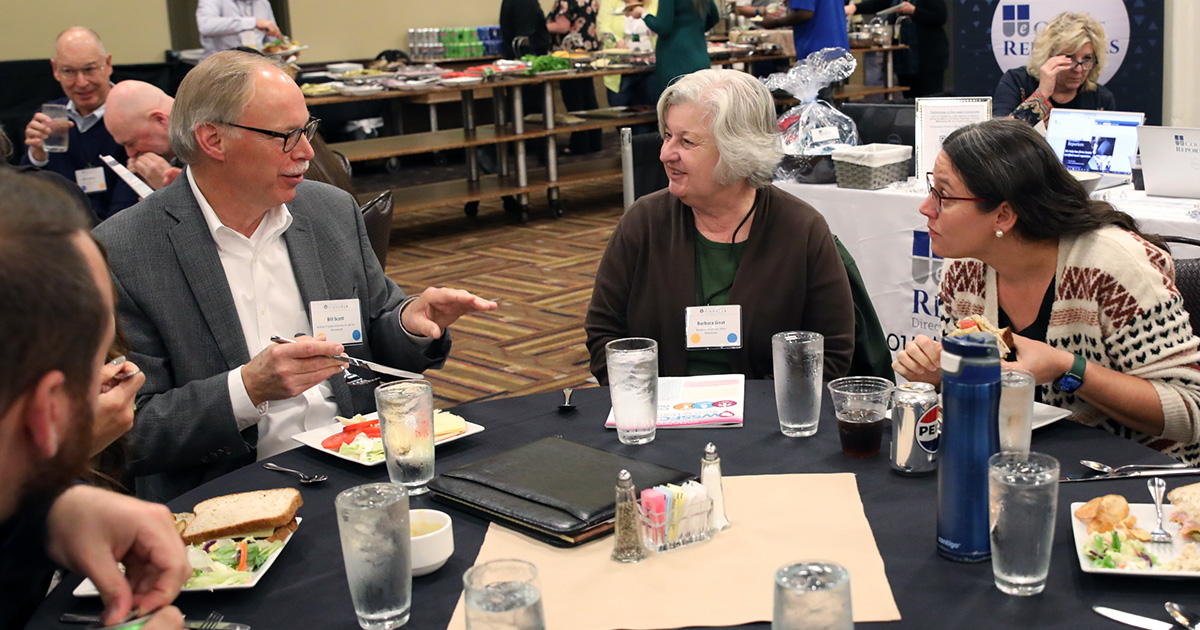
There was plenty of time between CLE sessions for discussions, including at the networking lunch on Thursday, Oct. 19.
Client Communications Require Care
Timothy Samuelson, director of the Office of Lawyer Regulation (OLR), presented a Friday morning breakout session titled “Leave a Message: Client Communication and Your Ethical Duties.”
Samuelson said that one quarter of the claims made to Wisconsin Lawyers Mutual Insurance Company involve lawyer-client communication issues.
Clear communication with clients is essential to both setting client expectations and avoiding an OLR grievance, said Francis Sullivan, deputy director at OLR, who presented with Samuelson.
“It’s your job to recommend a course of action, explain the probable results, and to work with your client and talk through decision-making authority,” Sullivan said.
Samuelson and Sullivan gave an overview of the requirements of
Supreme Court Rule 20:1.4. They also reminded lawyers of the State Bar’s
ethics hotline.
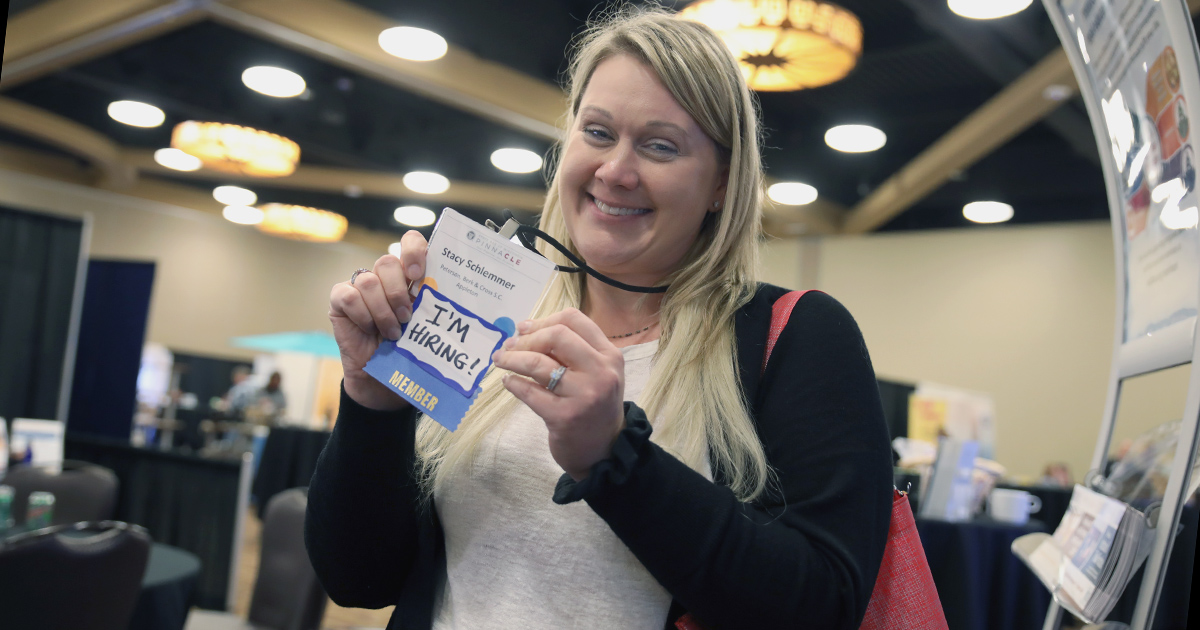
Stacy Schlemmer of Peterson, Berk & Cross, S.C., attended not only for the CLE programs, but let her colleagues know "I'm hiring!"
Less Multi-tasking, More Meditation
Imagine a workday marked by calm and productivity instead of an endless game of whack-a-mole.
That was the picture painted by Emily Dudak-Leiter during a Friday afternoon breakout session titled “Incorporate Attorney Wellness into Your Firm to Increase Efficiency.”
Dudak-Leiter told attendees the human body is ill-adapted for the stressors common to the practice of law: long sedentary hours at a desk, the combat and emotional reactivity that typify the adversarial system, and the high stakes involved in many legal disputes.
Dudak-Leiter, who’s both an attorney and a yoga instructor, said that breath work and yoga exercises that can be performed at one’s desk are two ways to work more peacefully and productively.
She also counseled favoring mindfulness over multi-tasking.
Dudak-Leiter told attendees that lawyer wellness is a crucial in attracting young legal talent.
“This is like health insurance,” Dudak-Leite said of lawyer wellness. “This is a benefit … to be a modern firm you have to do some of these things.”
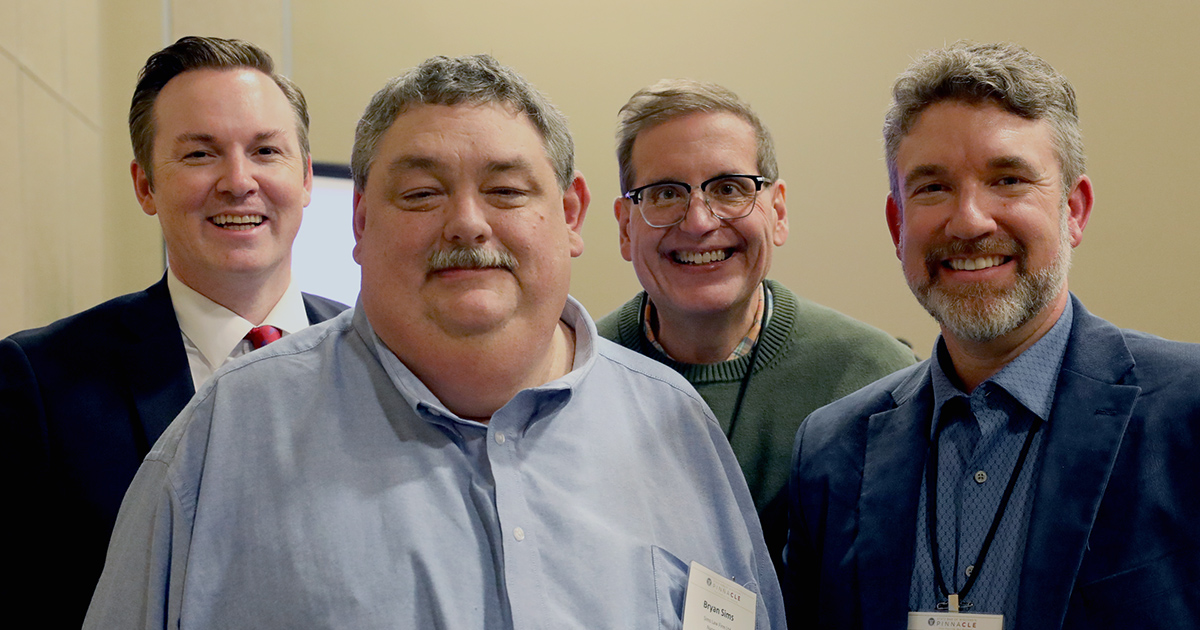
The four presenters for "50 Tips and Tricks" (from left): Christopher Shattuck, Bryan Sims, Nerino Petro, and State Bar Practice411 manager, Brent Hoeft (standing in for Jeffrey Krause).
12 Tips from the Wisconsin Solo and Small Firm Conference
Here are 12 tips from Jeffrey Krause, Nerino Petro, Christopher Shattuck, and Bryan Sims, who presented “50 Tips and Tricks” at the 2023 Wisconsin Solo and Small Firm Conference
- Use Ctrl-Shift-T to re-open browser tabs you mistakenly closed before bookmarking them.
- Use the dictation feature in Windows 10 and 11. The feature works best with a high-quality microphone.
- Use a laptop cooling pad to prevent your laptop from overheating, which could imperil important data.
- Use Spellbook, an AI tool, to highlight conflicting clauses and missing terms from draft contracts and other legal documents.
- Back-up your data! Companies like iDrive, Backblaze, and Carbonite offer back-up and cloud data storage.
- Buy a USB hub so you can connect a mouse, keyboard, hard drive, or printer to your laptop (new laptops come with fewer USB ports than older laptops).
- Use a standing desk. Even if you only use it while sitting, you can adjust the height of the desk to suit your height. Uplift, Vari-Desk, Hawthorne, and Deskhaus are among the companies that sell standing desks.
- Change the size, look, and speed of your cursor to customize your workflow. You can even change how many lines your cursor scrolls.
- Use Microsoft transcribe (chances are you’re already paying for it as part of your Microsoft suite). Just upload the audio, name the different speakers on the audio, and Transcribe will dictate the audio with speaker names and timestamps.
- Search the photos on your iPhone, for instance, by typing in the word “flower” in the search function in the Photos app. You can snap pictures of important things, then find them in the future by searching by a keyword.
- Use Rocketbook. Take notes on this re-useable notebook, then snap a photo of them with your smartphone and upload the photo into the cloud. You can download the notes from the cloud later if you need them.
- To reduce distractions and boost productivity, turn off message arrival notifications in Outlook: Go to File, Options, Mail, Message Arrival.
- Zoom harder: buy a good quality microphone and camera to make yourself look and sound professional. Blue Yeti (microphone) and Logitech Brio (camera) are two options.
Get More CLE: Don’t Miss Virtual Re-play of Solo and Small Firm Conference
Free webcasts for attendees of the 2023 Solo and Small Firm Conference are scheduled to take place during the weeks of Nov. 27 and Dec. 10. You can earn up to 8.5 additional credit hours, with a mix of standard CLE, LPM, and EPR credits.
The following sessions will be re-played:
Technology Considerations When Setting up A Law Practice
Know Your Niche
The Ups and Downs of Co-counsel
A Tenant Filed Bankruptcy – Now What?
Now and Into the Future: Legal Research with Fastcase and AI
Digital Forensics for the Digitally Fearful
Ethics of Working with Your Paralegal and Legal Assistant
Myths About Elder Law and the Power of the POA
Call the State Bar of Wisconsin Customer Service (800-728-7788) for your complimentary registration beginning on October 30, 2023.
